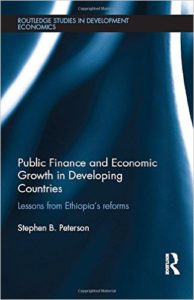
Review by David Fellows of: ‘Public Finance and Economic Growth in Developing Countries: Lessons from Ethiopia’s reforms’ by Stephen B Peterson PhD, Professor of Public Finance, Melbourne School of Government, Published by Routledge
This is a remarkable book. It has the ring of coruscating honesty which is unique in my experience of case-based literature that all too often proceeds seamlessly from challenge to solution. No battles, no reverses and a job well done, leaving the informed reader with an abiding sense of improbability.
As a stark contrast to the norm I found this book highly insightful about public financial management in general, not simply in relation to developing countries. The author tells of his attempts to develop systems that are appropriate to place and people and provide the Ethiopian state with a serious reforming experience as it recovers from a devastating civil war. We see the challenges he faces both from the state and from external agencies.
In particular, we see a huge range of requirements for financial systems, limited personnel and a low skill base supported by a development community that thinks in short timescales and finds it hard to accept the time needed to develop and embed major administrative reform.
We also see a development community presumption that favours advanced accountancy systems almost irrespective of their applicability. The potential danger being the creation of fundamentally unimproved public administrations either hooked on external consultancy or heading to chaos. We witness the tension between the author’s wish for the simpler approach that carries a greater learning potential contrasted with the leap forward desired by the World Bank but successfully resisted at least for the time being.
Devolution has a prominent position in this narrative too. Many see it as a way of resolving a whole range of problems including ethnic diversity, service priorities, performance management, corruption, public engagement, taxation and the administrative demands of a highly centralised bureaucracy. While devolution is helpful in some ways it often opens up new problems. The Ethiopian imperatives and the author’s stratagems are revealed and progress tracked.
Towards the end it appears that Ethiopia had developed a sustainable, not overly complex, accountancy solution that could be of widespread interest elsewhere only to discover that the authorities had changed their minds and opted to install a major accountancy package once the author had move on. Nevertheless, the scale of the contribution made by the author and his team in establishing the basis of financial administration in this war torn country is remarkable.
In all it is an enthralling read for those with a general interest in the challenges of international development as well as experts the field of public financial administration wherever they ply their trade.


